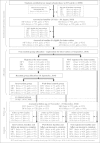Physical fitness and mental health impact of a sport-for-development intervention in a post-conflict setting: randomised controlled trial nested within an observational study of adolescents in Gulu, Uganda
- PMID: 24943472
- PMCID: PMC4079830
- DOI: 10.1186/1471-2458-14-619
Physical fitness and mental health impact of a sport-for-development intervention in a post-conflict setting: randomised controlled trial nested within an observational study of adolescents in Gulu, Uganda
Abstract
Background: Physical inactivity contributes to poor fitness and mental health disorders. This is of concern in post-conflict low-income settings where non-communicable diseases are emerging and there is limited evidence for physical activity interventions. We examined the effects of a sport-for-development programme on adolescent physical fitness and mental health in Gulu, Uganda.
Methods: We conducted a single-blinded RCT nested within an observational study with three unbalanced parallel groups. Participants were able-bodied adolescents aged 11-14 years. The intervention comprised an 11-week voluntary competitive sport-for-development football league. Participants who did not subscribe for the intervention formed a non-registered comparison group. Boys who registered for the sport-for-development programme were randomly allocated to the intervention or wait-listed. The girls programme subscription was insufficient to form a wait-list and all registrants received the intervention. Physical fitness was assessed by cardiorespiratory fitness (multi-stage fitness test), muscular power (standing broad jump) and body composition (BMI-for-age). Mental health was measured using the Acholi Psychosocial Assessment Instrument for local depression-like (DLS) and anxiety-like (ALS) syndromes. All randomisation was computer generated and assessors were masked to group allocation. An intention-to-treat analysis of adjusted effect size (ES) was applied.
Results: There were 1,462 adolescents in the study (intervention: boys = 74, girls = 81; wait-list: boys = 72; comparison: boys = 472, girls = 763). At four months follow-up there was no significant effect on the boys fitness when comparing intervention vs wait-listed and intervention vs non-registered groups. However, there was a negative effect on DLS when comparing boys intervention vs wait-listed (ES = 0.67 [0.33 to 1.00]) and intervention vs non-registered (ES = 0.25 [0.00 to 0.49]). Similar results were observed for ALS for boys intervention vs wait-listed (ES = 0.63 [0.30 to 0.96]) and intervention vs non-registered (ES = 0.26 [0.01 to 0.50]). There was no significant effect on the girls for any outcomes.
Conclusions: The sport-for-development league in this study had no impact on fitness and a negative effect on the mental health of participating boys. From this research, there is no evidence that voluntary competitive sport-for-development interventions improve physical fitness or mental health outcomes in post-conflict settings.
Figures
References
-
- Yusuf S, Reddy S, Ounpuu S, Anand S. Global burden of cardiovascular diseases: part I: general considerations, the epidemiologic transition, risk factors, and impact of urbanization. Circulation. 2001;104(22):2746–2753. - PubMed
-
- Zakus D, Njelesani D, Darnell S. The use of Sport and Physical Activity to Achieve Health Objectives. Toronto: Sport for Development & Peace International Working Group (SDPIWG); 2007.
Publication types
MeSH terms
LinkOut - more resources
Full Text Sources
Other Literature Sources
Medical
Molecular Biology Databases
Miscellaneous


